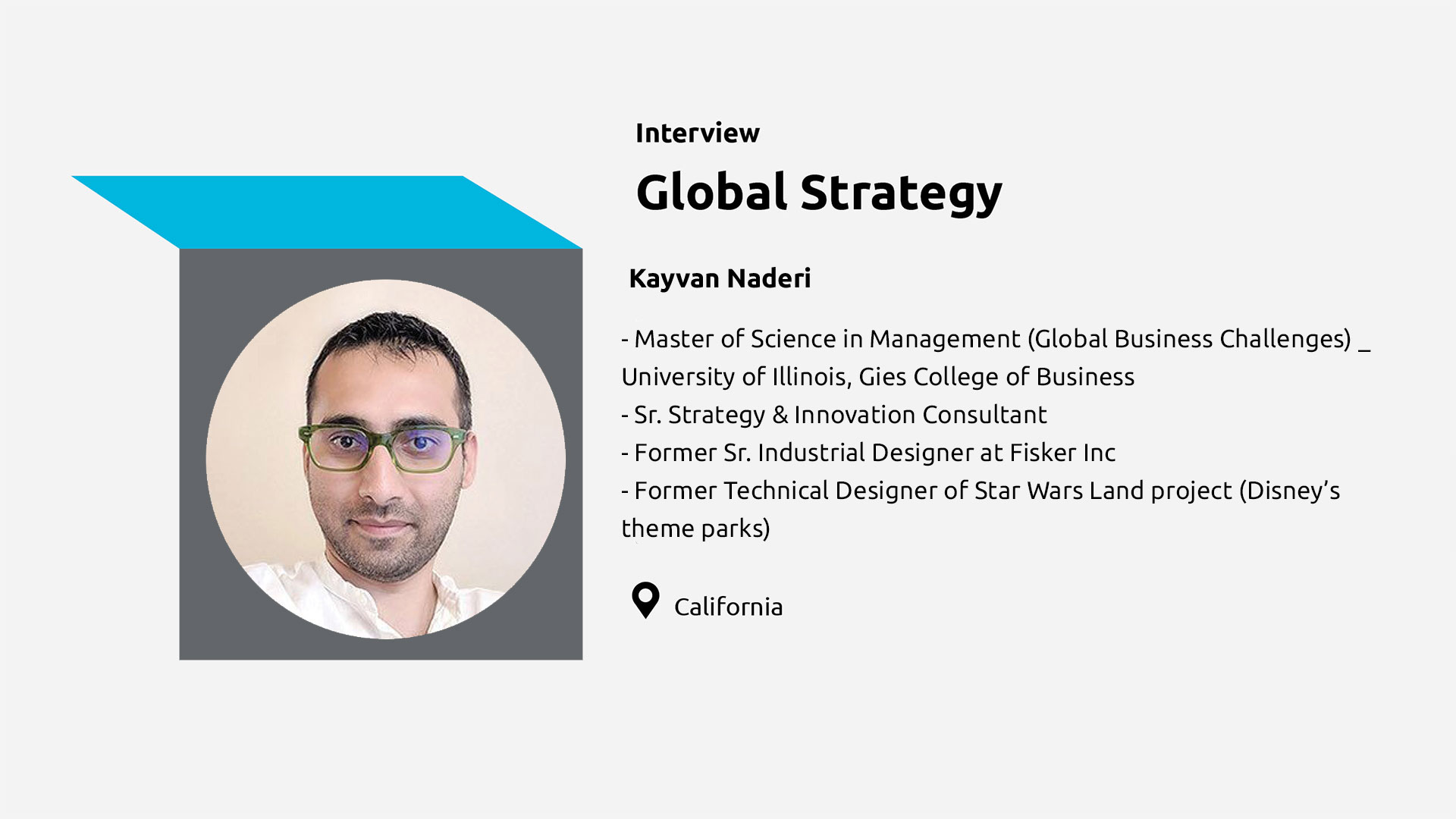

In this interview with Kayvan Naderi, we talked about global strategy, and why every business should be informed about it.
And how it can help all businesses advance, especially in a multidimensional country like Iran.
– What’s the difference between strategy(management strategy) and global strategy?
+ You made a good point because they’re usually mistaken for each other. Strategy and global strategy are two different aspects of strategy.
Most of us are familiar with the term strategy and have heard about it a lot in different contexts.
In short, management strategy focuses on the internal operations of organizations.
In contrast, the global strategy addresses activities that are taking place globally.
Moreover, we should adopt to take on the real world, which stretches far beyond our own company.
Let me explain it through a simple metaphor. Football (soccer) games illustrate management strategy in its most elegant form.
How the players play, how they stand in front of their opponents, their technique or strategy, and whether they play offensive or defensive.
And how the coach and players work together to succeed under different circumstances.
Looking at the team players as employees and seeing them from a broader perspective, what would we see?
The team has 11 players, a coach, an assistant coach, and a lot of staff.
Then we can think about the referee, audience, fans, other teams, stadiums, and surrounding businesses, and so on until we get to the bigger picture: the whole league and beyond.
As we see the situation from this angle, we notice that many things are beyond the players’ control.
And their efforts to win the game may not be effective at all.
In addition to the in-game strategy for winning the match, we need to know about the league’s rules.
How the team makes money, how they secure funding, and top players.
Who gets the broadcasting rights, and many more things that take place on a larger scale.
A comprehensive overview would include the global economy, globalization, local/ international regulations, and policies.
Knowing what determines our team’s success requires global strategy knowledge, even when it may not be obvious to individuals (players).
This is the difference between management strategy and global strategy.
-Does the company’s size affect its decision to adopt a global strategy?
Does it matter if a company is a start-up, a medium-sized, or a big one? Is global strategy related to all businesses or not?
+ It’s hard to give a definite yes or no answer.
The size of the company plays a role. Usually, the bigger a company gets, the more important its global strategy becomes.
A company that wants to grow globally or trans-regionally needs to be more aware of global strategy and incorporate it into its operations.
But a small company shouldn’t ignore it either.
Two factors determine how much a company needs to be aware of global strategy.
Firstly, it is the size of the company; Secondly, it is the type of business.
It may be much harder for multinational corporations to come to a deserted corner of the country.
To invest and take over a small business market for the simple reason that they don’t see financial rewards.
So, when your product/service is only suitable for a local niche market with a very low-profit margin, knowing global strategy may not be critical.
However, you might be a small company with only ten or fewer employees in IT, finance, etc.,
And likely have several regional or foreign competitors doing business in another market who may consider expanding into yours in the future.
In this situation, even a small firm should be proactive.
And stay informed about what is occurring in the global economy and develop their global strategy to succeed in the competition.
What determines our team’s success requires global strategy knowledge, even when it may not be obvious to individuals (players).
Even if you don’t intend to expand your market share, you need to know what techniques and methods rival companies are using.
To protect your business from competitors and not be eaten up by rivals, which often happens.
– What was the start of global strategy, and when did it take place?
+ The history of trading extends back thousands of years.
The ancient Roman Empire used to buy spices and fine textiles from India for many years. Europeans were obsessed with porcelain from China.
Perhaps the most famous trade route is the silk road which connected China and the ancient Roman Empire through the middle east.
This shows there has been trading in the world for centuries.
Yet, it was not until 1880 that the modern global economy and globalization were formed.
Hence, the world economy has got so interconnected that many multinational companies and transnational firms have emerged ever since.
The companies started doing various parts of the business in various countries and continents.
Including design, production, distribution, and sales.
Many of these developments and entanglements came about because of modern technologies.
Such as electricity, advanced transportation such as railroads, and modern communication such as the telephone and internet.
Along with these, the policies of the world’s superpowers changed in a way that allowed them to open up their borders.
For importing and exporting as we know it today, and globalization began to shape and grow and fall a few times but mainly grew after 1880.
In the 19th and 20th centuries, countries’ economic growth depended heavily on having access to cheap labor and raw materials.
From all over the world to exploit and dominate as many unsaturated markets as possible.
_ Some businesses assume that by opening an office/store overseas, they have entered the global economy and will succeed internationally.
Does this approach work?
+ Perhaps 90 or 100 years ago, things were different, but in today’s economy, having an office in another country doesn’t mean we will succeed in the global market.
If companies open offices or stores overseas, they may get a step closer to understanding global strategy.
But they may lose a lot of money if they do it based on incorrect assumptions.
To avoid that, they need a careful study of the global economy and target markets.
We have many examples of large corporations, such as Starbucks in Australia and Walmart in Germany.
They have suffered significant financial losses by expanding to new markets without thorough research and consideration of the market and culture of the target market.
In today›s extremely competitive market, most companies won’t succeed easily by having an office overseas.
And more studies and preparations are needed.
Firms that want to adapt to the foreign market often need to modify their business model and internal processes.
Thus, global strategy becomes a necessary tool for developing a long-term roadmap for succeeding in the global economy.
– We were discussing whether your business is a startup, a medium-sized company, or a big one.
You can use the global strategy process to advance it properly.
+ Another important point to mention is that some people think that just because their business is a small one and they’re not planning on giving any services in other parts of the world.
They don’t need to know about global strategy.
Although you might not feel the need for it, your rivals in other cities and countries are familiar with global strategy methods.
And if you are not, though giving the best services and products, you might lose your industry to some Iraqi, Chinese, or Indian rival five years from now.
But if you keep yourself updated and competitive and have reasonable growth, you cannot easily be eliminated by a Korean or Chinese rival.
In fact, in your business, you should always anticipate different things.
And know that if you are only focusing on your work, you might face the negative consequences of not studying your rivals in foreign countries to what’s taking place around you.
– Kayvan, when talking about global strategy, you also mentioned the CAGE distance framework.
And how it helps us go to our destination with knowledge and, after studying, decide whether we should invest there or not.
Considering Iran itself is a country with multiple, different cultures.
How will global strategy help us in Iran, specifically if we are planning to develop a business?
+ Iran is a large country. In Iran, we have four or five living languages.
Some people speak another language before learning Persian.
Even the foods and cultures are different from the north of Iran to the south in Bushehr and other parts of the country.
Unfortunately, some businesses don’t pay attention to these differences and use the same business model and strategy for different regions.
Even international policies may be different for a specific region in Iran.
It depends on whether these cities or provinces are borderline, next to the beach, next to large ports, or at the center of Tehran.
What their language is, or what kind of culture do they have?
And even though Iran has a central government, if you take a deeper look, you will notice that administrative tasks in Tabriz are done differently from those in Isfahan and Shiraz.
They are so similar yet have small differences that need to be acknowledged.
This is why global strategy methods help you be successful in a multidimensional country like Iran and if not aiming for a bigger market, at least maintain the one you already possess.
Let me give you another example of the international aspect.
Sunich is an Iranian soft drink company that became popular in Iran›s market about 30 years ago.
Then a Saudi Arabian brand called “Rani“ showed up.
We didn’t consider Saudi Arabia an industrial, multidimensional country, yet Rani drinks swiftly became a strong player in the market.

Rani wasn’t even much different from Sunich.
It just seemed tastier and trendier at the time. It had no unique technology that couldn’t be done in Iran. Yet, a country that
we might have underestimated dominating the entire market of Iran with just a drink, which is why we should be informed about these events.
– Thank you! I want to ask you a practical question about your own work experience.
When you are talking to a business department and trying to convince them to bring global strategy to their department and make it work, most probably some serious research and study has been done.
Because you have to define where this business should or shouldn’t go and what factors should or shouldn’t be studied.
So most likely there is a multi-expertise team behind this process.
I keep thinking about the challenges you face when convincing the CEO of the company that global strategy will work for them and that rather than being a cost, it is an investment.
Have you ever had these types of experiences?
+ It is best to introduce them to the concept, although it is difficult to expect much from a country like Iran.
since sometimes businesses are unaware of when and how globalization began.
why it’s good to know the rules of the game in the global economy.
And other fundamental concepts involved. Also, we can explain a few famous case studies.
For instance, a huge company like Starbucks in a country like Australia that is so similar to the American market loses billions.
So, we have to inform them about the financial reality of the world, whether on a world scale or a more internal scale.
And tell them about the economic future of different countries.
After getting familiar with the concept, they’ll come up with some questions.
For example, if they want to produce a product somewhere cheaper and sell it somewhere else.
Even on the scale of Iran, they still have to go further than Tehran.
For instance, they may have to produce it somewhere and then depot it somewhere else and assemble it in another city.
So when you put all these aspects together and explain the risks and returns they will understand how likely it is for them.
To lose or save hundreds of millions of dollars in the next 10 or 20 years.
So they will conclude that a six-month or one-year research project expense is an excellent investment.
But it’s not as if we do a study and they will get a final and exact blueprint like a treasure at the end.
If we give them this impression, we have misled them.
They should know that this is a path that they can better understand the things going on in their company.
Like how they should manage supply change on larger scales, reduce the risks, and use the job or financial opportunities of other places.
With this information and research, we will help them understand that no matter how much capability they have in producing and selling.
There’s a limit to how much they can sell in Tehran.
If they are making a sofa and have sold it to 80 percent or even 100 percent of the homes in Tehran, then no more homes will be left to sell.
By clarifying these things, they become much more interested in seeing global strategy.
As a path rather than just a quick research project that will lead to a final game plan.
-I think persuading CEOs and clients after they’ve made their decisions has its complications and challenges.
What I want to know is whether competitive advantages can be effective in defining the strategic destination?
+ Yes, there are some challenges. Some companies want to jump to a conclusion immediately.
Besides, this is because they know if they don’t take action in time, they will lose a lot of things in this fast-paced market.
Our best bet is to help them keep an open mind and see things they have never seen
before through this path. Provide them with some options backed by data explaining the differences between each one.
But let them know that they will be the ones to make the final decision and not the consultant.
– Thanks! Since we are reaching the end of this conversation, if any of the audience has any questions, they can ask.
And if I’ve missed any point about global strategy, I want you to please talk about it.
+ I think we should acknowledge two things that will change everything in the following 20 or 30 years, not just businesses but also lives as a whole.
One of them is climate change, the extreme hot or cold weather in some areas of the world that is
now so explicit after 40 years of warnings from some scientists.
In the next few decades, this issue will become more severe.
Second, it is super important to consider AI (artificial intelligence) in 30 or 40 years.
And how destructive it will be to an AI more advanced than human intelligence.
If we view current events the same way we did twenty years ago, we will lose many things on a financial and humanitarian level.
It illustrates how important it is to be aware of global strategy and events since they may have to set very strict rules on a global scale.
Your whole business can get blocked if we are not aware and informed since you are on the opposite side of international environmental policies.
Furthermore, it is inhumane to be indifferent to the future of the environment and what is happening around us.





